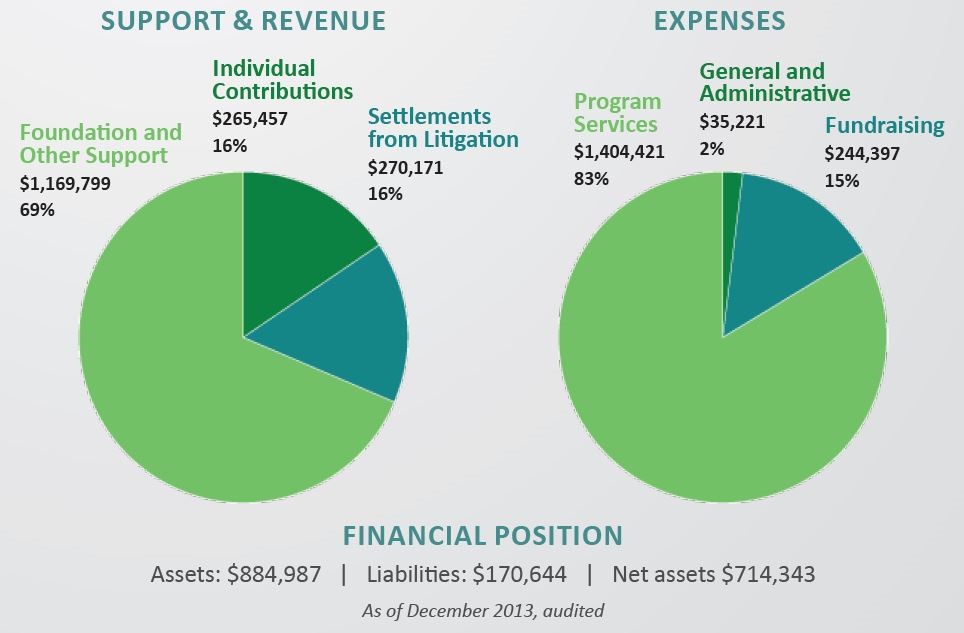In 2013, As You Sow engaged dozens of companies, including filing 15 shareholder resolutions, asking for increased responsibility on environmental and social issues by corporate boards and management. Some highlights of our program accomplishments are listed below:
Energy
- Our resolutions asking Exxon and Chevron to report on the risks of hydraulic fracturing were both supported by over 30% of voting shares at the companies’ annual meetings.
- Our resolution at CONSOL Energy on carbon asset risk, the first of its kind to go to a vote, was supported by nearly 20% of voting shares.
- We released Cleantech Redefined, a report examining the latest investment opportunities and trends across the cleantech sector.
- We released Disclosing the Facts, a scorecard report benchmarking gas companies’ transparency about their hydraulic fracturing practices, in collaboration with Boston Common Asset Management, Green Century, and the Investor Environmental Health Network.
- We negotiated a withdrawal of our shareholder resolution at Ameren in exchange for the company’s commitment to adopt a water policy and improve disclosure around water use and impacts on waterways.
Environmental Health
- Whole Foods Market announced that it will label all GMO foods in its stores by 2018 following dialogues with As You Sow.
- We organized a coalition of investors to urge companies not to oppose GMO-related ballot initiatives. Consequently, 14 of the top 50 donors opposing a California GMO initiative in 2012 did not spend funds to oppose a Washington initiative in 2013.
- We released Slipping Through the Cracks: An Issue Brief on Nanomaterials in Foods, and began engaging the food industry to prevent the use of potentially unsafe nanomaterials. Our nanomaterial food testing project raised over $6,000 to test M&Ms and Pop-Tarts. Nanomaterials were found in both products.
- Our Toxic Enforcement Division settled seven Proposition 65 cases for failure to warn of reproductive and carcinogenic chemicals in a range of consumer products. Our work led to product reformulations and placement of consumer warnings.
Waste
- McDonald’s agreed to replace foam hot beverage cups with paper cups at all 14,000 U.S. restaurants and select foreign markets following a shareholder vote and dialogue. Dunkin’ Donuts agreed on a timeline to phase out foam coffee cups, but has not yet decided on alternative materials.
- Proposals asking Amazon and Walmart to take back electronic waste were withdrawn after both companies agreed to a series of substantive dialogue meetings.
- We pressed brands to make all packaging recyclable, using plastic pouches as a symbol of wasted resources and spotlighting evidence of toxicity in ocean plastic. This led to a first-of-its-kind commitment by Colgate-Palmolive to phase out non-recyclable packaging by 2020.
Human Rights
- Responsible Sourcing Network (RSN), a project of As You Sow, co-authored Expectations for Companies’ Conflict Mineral Reporting, a white paper producted with Enough Project designed to give companies guidance for their Dodd-Frank conflict minerals submissions to the Securities and Exchange Commission.
- New signatories to our Pledge against Forced Child and Adult Labor in Uzbek Cotton included Ikea, lululemon, and Marks and Spencer, which helped surpass a total market capitalization of $1 trillion for pledge supporters.
- During the 2013 harvest, the Government of Uzbekistan almost entirely eliminated children under the age of 16 from the cotton fields. We are now focused on eliminating similar forced labor for adults.












